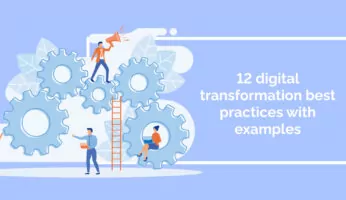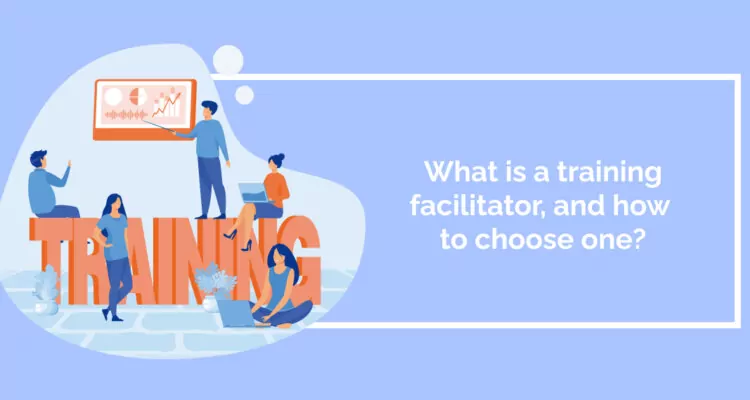
A training facilitator creates the learning content for an organization to allow efficient and effective learning to enable enterprises to thrive and each digital transformation work optimally.
Businesses implementing extensive employee training initiatives experience a 218% increase in income per employee compared to those lacking formalized training programs, so it’s worth hiring a training facilitator to help your company succeed.
To help you understand the role of a training facilitator and how to choose one, we will explore the following topics:
- What is a training facilitator?
- Why a training facilitator is important for an organization
- How to choose a training facilitator
- The role a Digital Adoption Platform (DAP) plays in the role of a training facilitator
What is a training facilitator?
Training facilitators play a pivotal role in the success of training programs, ensuring that the engaging training content they create for employees aligns with organizational needs.
Their role is instrumental in upskilling employees and fostering success through enhanced knowledge and skills.
Responsibilities include:
- Designing and delivering programs.
- Collaborating with experts for materials.
- Assessing effectiveness.
- Offering continual learner support.
Why is a training facilitator important for an organization?
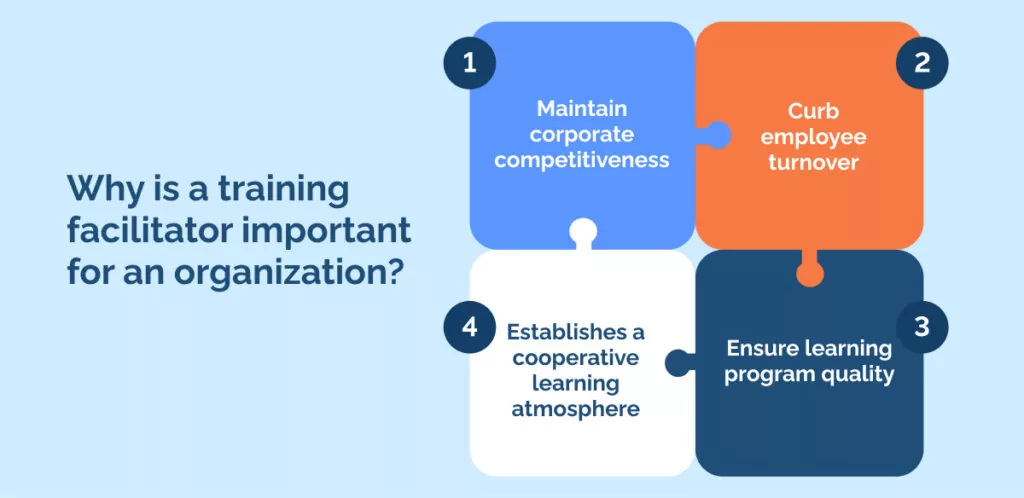
Collaborating with training facilitators requires time and effort but proves to be a worthwhile investment. They enable your employees to reach their utmost potential, fostering your organization’s prosperity.
Some key benefits include the following points.
Maintain corporate competitiveness
78% of leaders emphasize closing the skills gap for sustained growth. Training facilitators guarantee employees gain the essential skills and knowledge for role excellence, keeping them abreast of trends and positioning their company ahead in the competitive landscape.
Curb employee turnover
A substantial 94% of surveyed employees express willingness to stay longer with a company that invests in their career development, so it’s essential for all facilitators to be familiar with the learning management system (LMS) to keep track of employees’ training progress.
Ensure learning program quality
Facilitators assure the excellence of your learning and development initiatives. They ascertain training effectiveness and alignment with their organization’s requirements.
Additionally, they furnish participants with resources for ongoing learning beyond program completion, visual aids, and other tools for every learning need using human resources management techniques.
Establishes a cooperative learning atmosphere
A training facilitator goes beyond imparting knowledge and actively cultivating employee collaboration, teamwork, and group discussions to bolster your organization’s learning culture.
Organizations empower employees to stay ahead by investing in training facilitators, ensuring sustained productivity and success.
How do you choose a training facilitator?
Choosing a training facilitator involves looking out for a strategic blend of skills and experiences, which people applying for this role must demonstrate with qualifications and examples of times they have used these skills in previous roles.
When choosing your next training facilitator, consider the following:
Qualifications & Experience
People applying for this role may need certain qualifications to prove their value, especially as learning and development are central to the role.

The qualifications and experience needed for the role usually include:
- A Bachelor’s degree in a related field.
- Proficiency in Microsoft Office Suite.
- Experience in developing and delivering training materials.
- Strong understanding of adult learning principles.
An added benefit would be prior experience within a similar role.
Key Skills
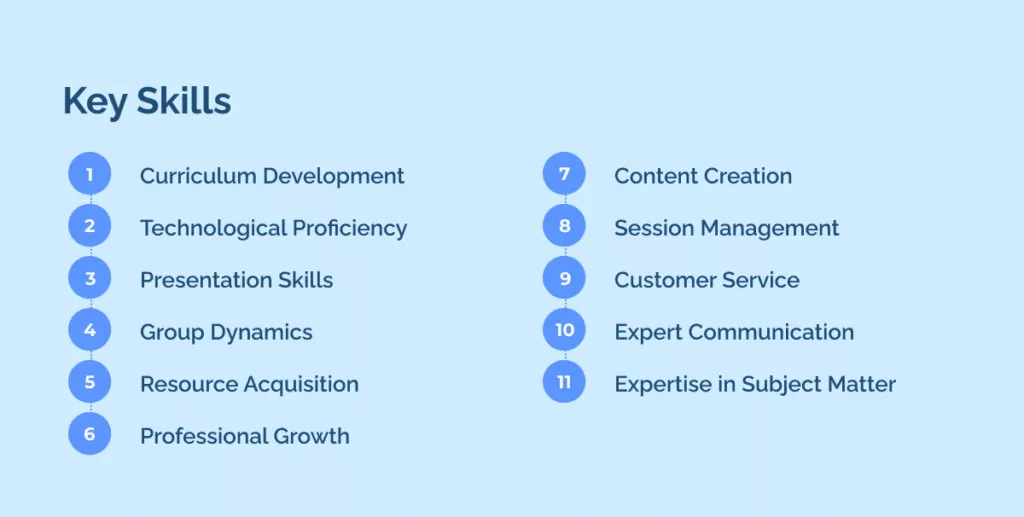
Training facilitators are instrumental in creating an effective learning environment, and their role necessitates a diverse skill set. When choosing the right candidate, look to see if they can demonstrate the following skills:
Curriculum Development
At the heart of a facilitator’s expertise lies the ability to craft training programs. This includes understanding organizational psychology to integrate learning seamlessly into a company’s culture.
Technological Proficiency
Staying ahead with technology, facilitators should be adept at utilizing advancements like Augmented Reality (AR) and Artificial Intelligence (AI) to enhance learning and meet a variety of training objectives.
Presentation Skills
Creating engaging PowerPoint presentations is fundamental for facilitators, ensuring they can deliver informative and visually appealing content in both group and one-on-one settings.
Group Dynamics
Understanding the unique dynamics of a training class is crucial. Facilitators must be confident in addressing the diverse learning needs of individuals and managing training costs effectively.
Resource Acquisition
High-quality training materials are key, and skilled facilitators must be proficient in sourcing and applying the most suitable materials for any learning initiative.
Professional Growth
Ongoing professional development is essential for facilitators to stay current, continuously enhancing their methods and adapting to changing industry standards.
Content Creation
The ability to design comprehensive training content is vital for engaging participants and addressing varied learning objectives.
Session Management
Managing training sessions effectively is important for maintaining a lively, interactive learning atmosphere that fosters engagement and retention of knowledge.
Customer Service
Top-notch customer service skills are necessary for building positive rapport, creating a supportive learning space, and empathetically addressing learner concerns.
Expert Communication
Mastery of presentation techniques is needed for clear and compelling communication, keeping audiences engaged and making complex information accessible.
Expertise in Subject Matter
Being an expert in the subject matter not only bolsters a facilitator’s credibility but also ensures confidence among participants, leading to effective learning transfer.
Responsibilities of training facilitators
Facilitators are responsible for building the learning environment and all training methods from top to bottom. Responsibilities may vary depending on the needs of different organizations.
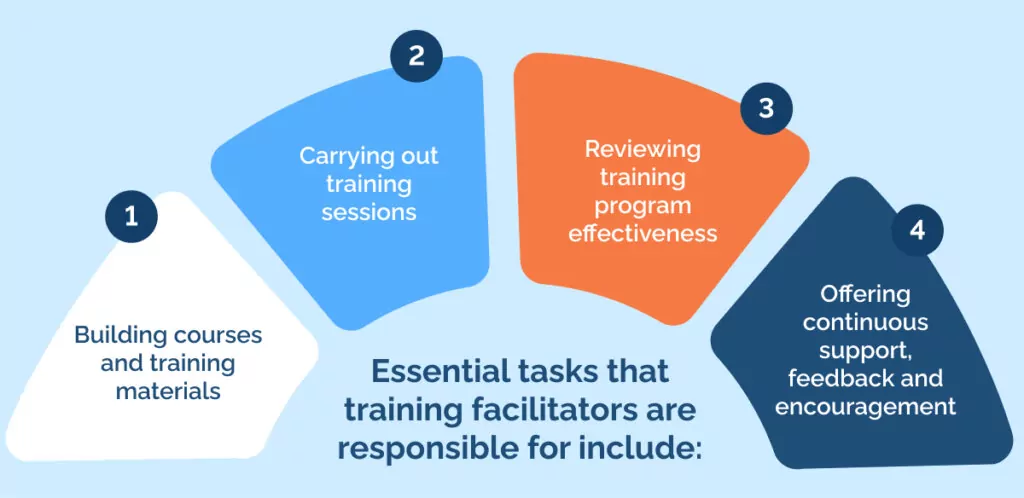
Essential tasks that training facilitators are responsible for include:
1. Building courses and training materials
Training facilitators create entire corporate learning programs. They set goals, create materials, and design the course structure from scratch.
2. Carrying out training sessions
Once they’ve made the learning programs, facilitators give them value by leading training sessions. They share knowledge, give on-the-spot tips, encourage participation, handle issues, and help employees learn during these sessions.
3. Reviewing training program effectiveness
After each training session, facilitators gather data and feedback. They use this information to check and enhance how well their corporate learning program works.
Tools like learning assessments help them figure out who needs extra help and identify trends that show where the curriculum can be improved.
4. Offering continuous support, feedback and encouragement
Facilitators help learners before, during, and after training using the following support methods.
- Before: They explain the program so employees know what to expect.
- During: They answer questions and help learners.
- After: They offer more support or resources if necessary.
Throughout this process, they also provide feedback and encouragement to support learners to complete their courses.
What part does a DAP play in the role of a training facilitator?
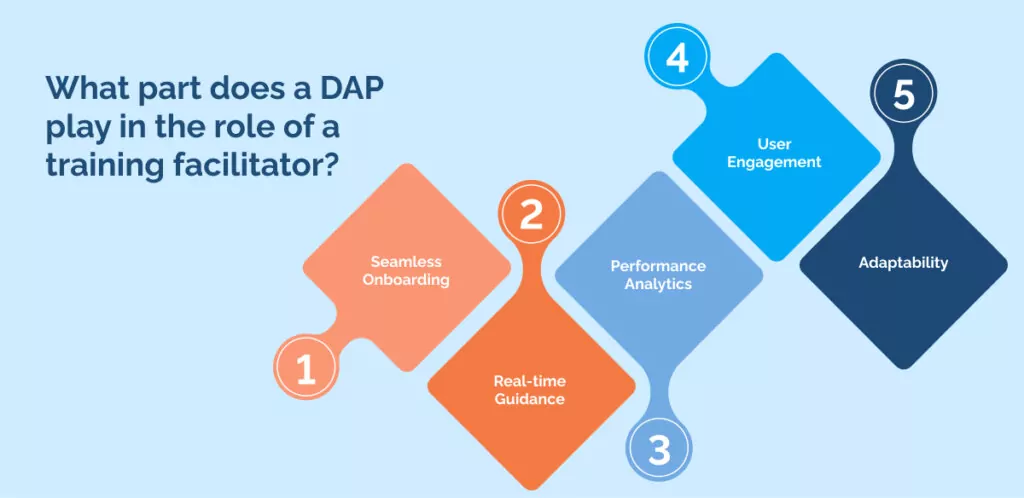
A digital adoption platform (DAP) empowers training facilitators to deliver more personalized, efficient, and engaging training experiences, fostering an organizational culture of continuous learning improvement.
Here are the most important ways a DAP supports training facilitators:
Seamless Onboarding
DAPs streamline the digital onboarding process, ensuring new users quickly grasp digital tools and platforms, reducing the learning curve.
Real-time Guidance
Training facilitators utilize DAPs to provide instant, context-sensitive guidance during training sessions, addressing queries and challenges promptly.
Performance Analytics
DAPs offer in-depth analytics, enabling facilitators to track user progress, identify bottlenecks, and tailor training content for maximum impact.
User Engagement
DAPs enhance employee experience and engagement through interactive guides and tutorials, keeping participants involved in learning.
Adaptability
Training facilitators leverage DAPs to adapt training content dynamically, accommodating diverse learning styles and preferences.
Choose a training facilitator to invest in others
Support your staff to embark on a transformative journey by hiring a training facilitator to invest in the development of your staff.
Facilitators empower individuals to unlock their potential and enhance their skills and their value goes beyond simple training delivered by tools.
Investing in employee learning sparks positive change, setting off a chain reaction that fosters growth and success. As facilitators steer staff along their educational journey, this investment not only aids personal development but also bolsters the continuous advancement of the organization they serve.
Tristan Ovington
Tristan Ovington is a professional senior writer and journalist, specializing in providing expert insights on various topics such as digital adoption, digital transformation, change management, and Cloud apps. He delivers his knowledge through accessible online content that is data-driven and presented in a friendly tone, making it easy for readers to understand and implement.


